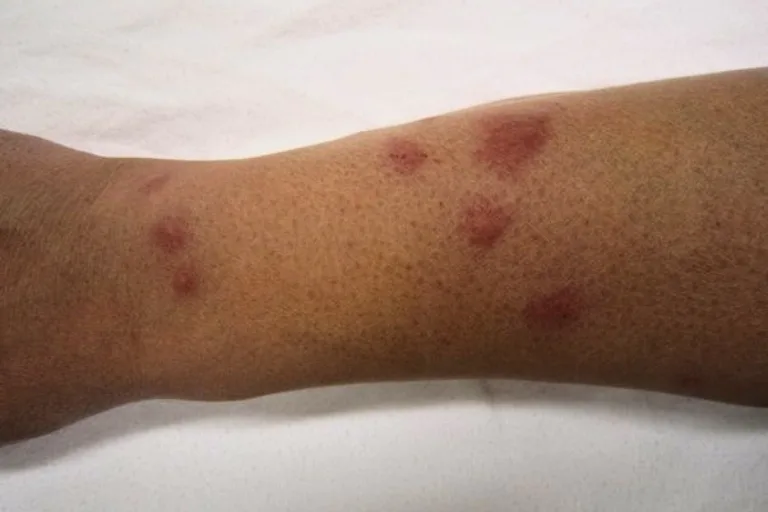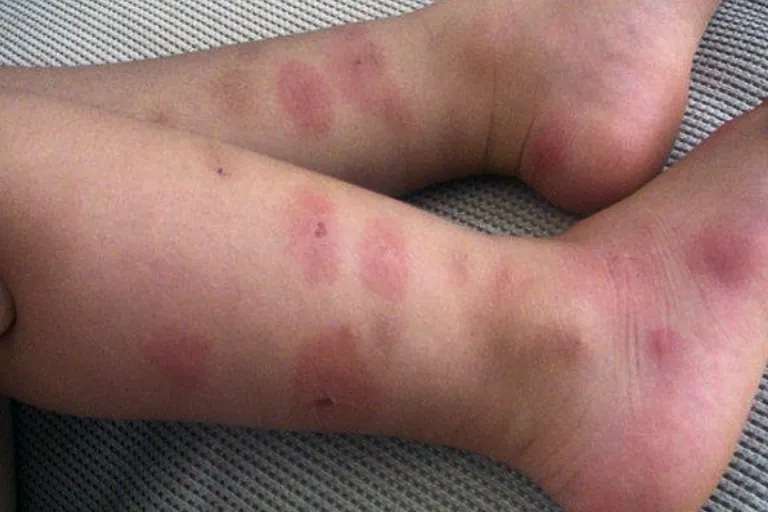A cockroach bite is highly unlikely to kill you. These pests do not produce venom that is deadly to humans.
Bearing the discomfort and annoyance of potentially encountering a cockroach, one question that often springs to mind is their ability to inflict harm through biting.
Cockroaches are omnivorous scavengers, typically feasting on organic detritus, which means human encounters are incidental rather than predatory.
While they can nip at human skin, their bites may cause irritation, redness, and swelling.
However, a bite from a cockroach is not inherently fatal. The genuine concern lies in the fact that cockroaches can carry pathogens due to their unsanitary habitats, which pose a higher risk to humans than the bite itself.
While these bites are quite rare, maintaining clean living environments and proper food storage practices is the best way to prevent any cockroach-related issues, including bites.

Understanding Cockroach Behavior: Can They Bite?
It’s late at night, and you’re up reading about these resilient creatures that have outlived dinosaurs: cockroaches.
A question pops into your mind, Can a cockroach bite be lethal?
Let’s debunk some myths and understand the real behavior of these crawling insects to address your concerns.
Cockroach Diet Preferences And Human Interaction
Cockroaches are notorious for their survival skills and dietary flexibility. They are omnivores that feed on almost anything imaginable, including:
- Decaying organic matter
- Sweets, starches, and meats
- Paper products
- Fabric
Despite this, human interaction is minimal in terms of their diet. Cases of cockroaches biting humans are exceedingly rare since human flesh is not a preferred source of nutrition for these insects.
The Anatomy Of A Cockroach Bite: How Does It Happen?
When it does occur, a cockroach bite is the result of their strong mandibles, designed to cut through tough materials.
If a cockroach resorts to biting a human, here’s how it might unfold:
- The cockroach perceives a source of food.
- The insect approaches, undetected, usually while the potential ‘food’ source is stagnant (like during sleep).
- It applies its mandibles to the skin, leaving a small, red bump if successful.
Infection is typically the primary concern with such bites, not the bite itself.
Frequency And Common Scenarios Of Cockroach Bites
Are cockroach bites something to lose sleep over? Here’s what the evidence suggests:
| Frequency | Scenario |
|---|---|
| Rare | Overpopulated living conditions with poor sanitation |
| Extremely rare | Individuals with open food sources near sleeping areas |
| Almost non-existent | Clean, well-maintained households without access to food |
Bites are more common in situations where cockroach populations are large, and their regular food sources are scarce.
They might inadvertently bite humans in a quest for food residue on human skin.
Dispelling Myths: Evaluating The Lethality Of Cockroach Bites
Cockroaches merely mentioning them can evoke a shudder. Known for their persistence and perceived uncleanliness, they unexpectedly find their way into our homes, but what about the notion that they can be lethal?
Urban legends and misconceptions have given rise to fears that these critters could cause serious harm, or worse, death through their bites.
Let’s unravel the facts and dispel the myths about the lethality of cockroach bites.

The Components Of Cockroach Saliva: Toxic Or Harmless?
It’s not uncommon to question whether the saliva of a cockroach can be harmful. Let’s break down the science.
Cockroach saliva is designed primarily for digestive purposes, not for defense or attack.
Enzymes and proteins that break down food particles are their main components, and toxicity to humans is not one of their characteristics.
Essentially, while the thought of a cockroach bite may be unpleasant, the saliva itself is harmless when it comes to toxicity.
Infection Potential From Cockroach Bites
While a direct cockroach bite may not be toxic, it isn’t entirely without risk. The real concern with a cockroach bite is the potential for infection.
These insects often traverse through unhygienic environments, picking up bacteria and other pathogens along the way.
If a person is bitten, these microbes can be transferred to the wound.
Therefore, it is crucial to clean the bite area promptly and observe for signs of infection such as redness, swelling, or pus.
Recorded Incidents And Medical Opinions On Fatalities
Searching medical databases and scientific studies reveals a lack of evidence supporting any fatalities due to cockroach bites.
Cockroach bites are exceedingly rare to begin with, and a direct causal link between a bite and death is even rarer.
Most medical opinions agree that while a cockroach bite can be an unsettling experience, it is unlikely to be fatal.
What’s more crucial is addressing any emerging symptoms of an allergic reaction or infection, which can lead to complications if untreated.
Health Concerns And Prevention Strategies
The pervasive nature of cockroaches in urban environments can often lead to potential health concerns.
Cockroach bites are relatively rare, but when they do occur, they can cause a range of reactions and may have implications for human health.
Understanding the risks associated with these critters and implementing effective prevention strategies is essential to minimize their threat.
Allergic Reactions And Secondary Complications From Bites
Bites from cockroaches are not typically known for being deadly; however, they can result in allergic reactions and introduce pathogens leading to secondary complications.
The cockroach saliva contains allergens that might trigger an allergic response in sensitive individuals, displaying symptoms such as:
- Swelling at the site of the bite
- Itchiness
- Redness and rash
Moreover, secondary infections like cellulitis can occur if bacteria enter the wound and are not appropriately treated.
People with compromised immune systems or existing health conditions should be particularly vigilant about any insect bites.
Preventing Cockroach Bites: Sanitation And Home Remedies
Maintaining a clean environment is the cornerstone of preventing cockroach infestations and subsequent bites.
Following a few simple yet effective strategies can significantly reduce the risk:
- Keep kitchen surfaces and floors free of food crumbs and spills.
- Seal cracks in walls or around cabinets that could serve as entry points or hiding spaces.
- Regularly dispose of garbage in sealed containers to avoid attracting cockroaches.
Home remedies can offer an additional layer of protection. These include:
- Setting up boric acid traps
- Sprinkling diatomaceous earth in areas where cockroach presence is detected
- Using natural repellents like catnip, bay leaves, or cucumbers
What To Do If Bitten: First Aid And When To Seek Medical Attention
In the unlikely event of a cockroach bite, prompt first aid is crucial.
This includes:
- Washing the bite area with soap and water to prevent infection
- Applying an antiseptic cream or lotion
- Using a cold compress to alleviate swelling and discomfort
The majority of bites will heal without issue but seek medical attention immediately if you experience severe allergic reactions, signs of infection, or if your symptoms persist.
These could manifest as excessive swelling, pus, increased redness, or fever.
FAQs Of Can A Cockroach Bite Kill You
What Happens If Cockroach Bites You?
A cockroach bite may cause irritation, redness, and swelling. Clean the area to prevent infection. If symptoms worsen, seek medical attention. Avoid scratching to reduce the risk of infection.
Do Cockroaches Bite You At Night?
Cockroaches can bite at night, typically if food sources are scarce. They may nibble on fingernails, eyelashes, feet, and hands, causing minor wounds.
What If A Cockroach Touches You?
If a cockroach touches you, don’t panic. Wash the area with soap and water to remove any potential germs. Cockroaches are not poisonous, and the touch itself is harmless. Regularly clean your home to prevent future encounters.
What Does A Cockroach Bite Look Like On A Human?
A cockroach bite typically appears as a red, raised bump, similar to a mosquito bite. It may become swollen, itchy, and can irritate.
Final Thoughts
Rest easy knowing that a cockroach bite, although unsettling, poses no lethal threat.
Practicing cleanliness is key to avoiding these pests and their uncomfortable nips.
Keep your living space tidy to steer clear of cockroach encounters and the health risks they could bring.
Stay safe, stay informed.
Resources:
1. http://npic.orst.edu/pest/roach.html
2. https://www.tn.gov/health/cedep/environmental/safe-places/safe-operation/pest-management.html
